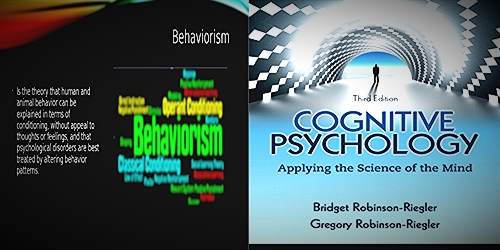Difference between Behaviorism and Cognitive Psychology

In the tunnel of psychology, there are different schools of thoughts which are worthy to talk about. There are so many disorders today to discuss but we don’t know the base or crux of their notion. How do they come? How do they knock our minds? There is an utter confusion that either behaviorism is a cognitive psychology or something similar or relate to that. Both are the different school of thoughts mainly dealing in the field of psychology. But to remove the utter confusion and their working, there is a need to know the difference. Let’s know the difference between Behaviorism and Cognitive Psychology:
What is Behaviorism?
Behaviorism is a branch of psychology that mainly deals with actions of the people. Those actions are mainly those which they acquire in the external environment.
What is Cognitive Psychology?
Cognitive psychology is mainly defined as the psychology that refers to the mental process that alters the person’s behavior.
Behaviorism vs. Cognitive Psychology
History
Behaviorism came in the early 1990s. It was a combination of philosophy, methodology and theory. It was a reaction to depth psychology that gave hypothesis that couldn’t be tested with the help of clinical experiments. Behaviorism took inspiration from the works of Thorndike who pioneered the law of effect in late 19th century.
Technically, cognitive psychology has been thought about in the world since the time of Plato in ancient Greece. Various theories related to “how the mind works?” have come forward since. In 1637, Rene Descartes forwarded the idea of mind-body dualism. Cognitive psychology became a field of great importance in the mid-1950s.
Major psychologists
Some of the major psychologists who worked towards the establishment of behaviorism through clinical research were B.F. Skinner and Ivan Pavlov. In 1930s, Skinner gave the theory of radical behaviorism which he termed as the “philosophy of the science of behavior”. Ivan Pavlov gave the theories of respondent and operant conditioning.
Some of the major psychologists who worked in the field of cognitive psychology are George Berkeley, John Locke, Immanuel Kant, Paul Broca, Carl Wernickle, Noam Chomsky, George Mander, etc.
Their beliefs and their views as psychologists
The behaviourists and the psychologists are mainly of the view that behavior is always influenced by the external environment and the atmosphere plays a vital role in examining the behaviour of a person. A famous psychologist, named Ivan Pavlov, he added up two major conditioning behaviors.
- Classical conditioning
- Operant conditioning
In the first case, behaviourists are of the view that a person or animal can be trained in a particular environment by repetitive practice, they are supposed to repeat after the practitioner in order to acquire that behavior.
In the second case, it is partly based on the rewarding of the desirable behavior that is really needed to be curbed.
On the other hand, for cognitive psychology, the cognitive psychologists believe that actions are entirely based on the mental processes of reasoning, logical thinking, recall, motivational thoughts, positive and negative thoughts, etc. It is a very important aspect of psychology as it differentiates humans from animals. This branch of psychology is based on intellectual and logical reasoning which only humans are capable of. In short we can say their entire actions and thinking process result in a behavior. The intellectual reasoning plays a vital role in determining the cognitive ability of a being.
Digging out an example will surely help in grasping the concept!
If we consider students learning, the views are different. According to the behaviorist, a student usually learns on the basis of the rewards or punishment they get or in the fear that they will be marked or punished.
But this is not the case in cognitive psychology, students learn mainly due to their motivational thoughts they inherit since birth. That mental process further motivates them to study more and gain more in future. This is very interesting because it motivates a learner and helps in learning more and more.
How much contribution they both have made in the applied psychology?
In the field of applied psychology, both have contributed a lot in many ways. When we consider behaviourism, it is helpful in the remedy of alcohol and drug centres. In very sensitive cases, it is very helpful for example in panic attacks, depression attacks or any other attack related to the behavior.
For example, if we say a person is failed in GAT test, his line of thought will be further stated that he cannot do further anything in life. He will be depressed and may remain desperate. In this state of ambivalence and depression, therapists will help him to overcome his problem by first identifying the problem, the reason and after knowing all that, they will change his outlook of life or ideology to view the life differently.
Conclusion
Cognitive psychology and behaviorism are two branches of the same tree i.e. psychology. Their focus is on the brain and its functioning. Behaviorism lays emphasis on external behavior and stimuli-response relationship. It doesn’t focus on the internal processes of the mind. On the contrary, cognitive psychology studies mind as an information processor. It attempts to make cognitive models of what goes inside a person’s brain. It studies perception, attention, language, memory, thinking and consciousness. But undoubtedly, both of these theories have their own implications on modern day lives. Do share your opinion with us.


Leave a Reply